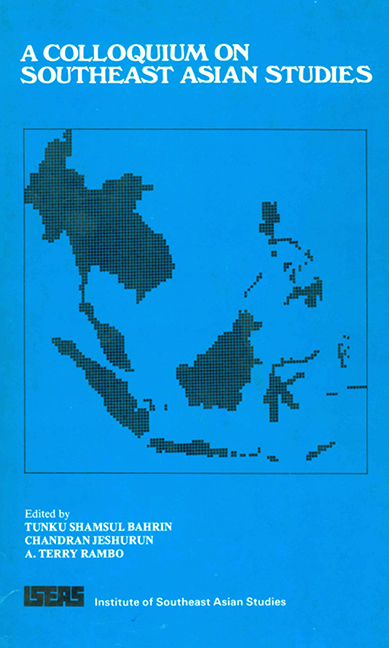Introduction
Published online by Cambridge University Press: 21 October 2015
Summary
The University of Malaya can be justly proud in having pioneered the teaching of Southeast Asian Studies as an undergraduate programme in its Faculty of Arts and Social Science in 1976. The degree of Bachelor of Arts in Southeast Asian Studies has now been awarded annually since 1979 and the Faculty of Arts and Social Science is actively developing a number of other fields of studies partly as a follow-up of the successful introduction of the multi-disciplinary Southeast Asian Studies programme. In order to commemorate the launching of the University of Malaya Southeast Asian Studies programme as well as to consider the “State of the Art” internationally, so to speak, the Faculty of Arts and Social Science organised a Conference on Southeast Asian Studies from 22 — 26 November 1977. It was an unique Malaysian event in more than one way for the organisers selected Kota Kinabalu, the capital of the State of Sabah in Malaysia, as the venue for such a select academic gathering. On the international plane, too, it was felt that Kota Kinabalu would ideally represent the ‘hub’ of Southeast Asia and offer foreign scholars who have long worked on various corners of the region a rare opportunity of visiting the island of Borneo. As it turned out the organisers were more than gratified by the spontaneous response of both benefactors as well as participants to the idea of such a Conference and it was with much reluctance that the actual number attending had to be limited. As one foreign scholar at least remarked subsequently, the timely nature of the meeting was further enhanced by the appropriateness of the venue at the foot of Mt. Kinabalu, the highest point in Southeast Asia.
The Conference itself was divided into several levels:-
(i) a number of distinguished individuals were specially invited to deliver key-note addresses on selected topics encompassing the entire range of what Southeast Asian Studies constitute; a concerted attempt was also made to obtain a comprehensive account of the individual experiences of Southeast Asian Studies in different countries and their Country Reports formed an important element of documentation at the meeting;
- Type
- Chapter
- Information
- A Colloquium on Southeast Asian Studies , pp. xiii - xivPublisher: ISEAS–Yusof Ishak InstitutePrint publication year: 1981



